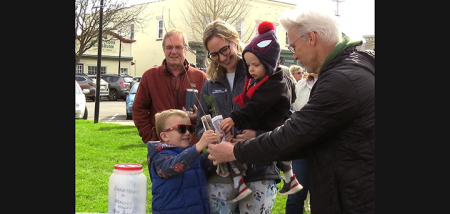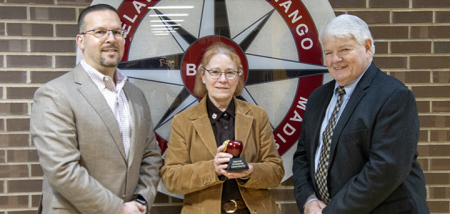Tilting At Windmills: But Where Is Your Heart?
Published:
January 7th, 2022
By:
Shelly Reuben

I was listening to an Old Time radio station the other day when a tune came on that I hadn’t heard in years. It was from the 1952 movie Moulin Rouge, produced by John Houston, and staring José Ferrer as Toulouse-Lautrec. The music and lyrics, by William Engvick and George Auric, went like this:
Whenever we kiss
I worry and wonder
Your lips may be near
But where is your heart?
Pretty heavy stuff for the little girl I once was, to say nothing of the film’s tragic story, which included a love-sick dwarf, a mercenary prostitute, high-kicking voluptuous dancers, alcoholism, abandonment, and a lethal drunken fall down a flight of stairs.
Yet all tragic memories of the movie’s plot dissolved into nothingness when my father – my adorable father who loved his five children more than anything – came home from wherever he had been that day (he was an inventor, so it could have been a machine shop, a Mexican taco stand, or a patent office) with a gift.
For me.
I thought it was the most wonderful...the most romantic...the most exotic gift in the world.
It was a gold compact, about the size of a contemporary compact, but higher and rounder, with scalloped edges and ornate curlicues etched into its top. It looked like something a Tsar would give to a Tsarina or a Parisian courtesan would receive from a doting king. When you clicked it open, there was a pretty piece of mesh covering pressed powder, and above that, a fluffy white powder puff.
On the underside of the box was the true wonder, though, for there was a miniscule key that, if you wound it and pushed a tiny button, turned the compact into a music box, and (hush and listen for a moment), it played the song from the movie Moulin Rouge. As the notes tinkled, I murmured the second chorus of the lyrics in my mind:
You must break the spell
The cloud that I’m under
So please won’t you tell
Darling, where is your heart?
I would hold the gold compact in my hand and play the song at night in my bed; I kept it with me all through high school; I took it to college, and I brought it with me to New York City after I quit college. But somewhere along the line when I wasn’t looking, I grew up, and I lost it. I lost my beloved compact.
My beloved “thing.”
Now I will tell you about my folding bicycle, another gift that my magical father gave me. It was maroon, with all the accouterments necessary for a comfortable ride. Padded seat. Handle bars (if you unscrewed a big key in the middle, they folded down like wing flaps on an airplane). Pedals. A Chain. Fenders. Wheels. Spokes. And a foot brake. Another big key attached the two halves of the bicycle – front and back frames and wheels – somewhere in the area of the kickstand.
I rode that folding bicycle to and from New Trier High School along Green Bay Road. I brought it with me to the University of Illinois and the University of Missouri. After I dropped out of college for the second time, I returned to New York City, stayed a while, and then moved to Princeton, New Jersey, where I rode my bike to the small airport where I worked part-time in exchange for flying lessons.
I kept my folding bicycle nearby when I returned again to New York, held onto it tightly as I moved through a series of dreary apartments, and then I brought it with me to Brooklyn after I married the man of my dreams and we moved into a gorgeous three bedroom, two bathroom apartment with parquet floors.
After that, the bicycle disappeared.
I know it was my fault, but I don’t like to think of it. So I won’t.
I did, however, treasure that ingeniously designed mode of transportation, and have much to be grateful for, as it safely carried me to so many wonderful places (with my hair flying in the wind before the days of helmets) over so many incredible years.
Last among the things that I loved and lost was my red IBM Selectric typewriter. A gorgeous, masculine, powerful instrument. Indeed, the Rolls Royce of QWERTY technology, with sturdy, obedient keys over which my fingers flew and from which my imagination took wing.
I was living on the fifth floor of a five story walk-up on York Avenue in Manhattan when Mr. Gaschen, the father of a friend (he used to call me “Future Famous Writer”) decided that a number 2 pencil and a legal pad were not sufficiently sophisticated for my talents. So from Anchorage, Alaska, where he lived, he mailed me the aforementioned magnificent machine.
The box was huge and heavy. I had no idea what was inside, but believing in miracles and fairy god mothers (or in this case, fathers), I lugged it up four flights, set in on my kitchen table, opened it, and fell in love. I typed over 100 short stories on my faithful Selectric, at least two books, two plays, one television script, one movie scenario, dozens of poems, countless submission letters to literary agents and publishers, and even more missives to family and friends.
And then – I feel like a faithless lover – IBM came out with a self-correcting typewriter. No more need for white Ko-Rec-Type tabs. After that came a word processing typewriter, with disks and a memory! And finally...computers.
I bow my head in shame. I know where my beautiful, irreplaceable, red IBM Selectric went, but I am not telling you. I’m too embarrassed
I write this now, not to confess my carelessness and misdeeds, but as a paean to things cherished and lost. Inanimate objects to which we owe the loyalty that we would give a devoted friend. Objects – because they served us so well and gave us so much – that we endow with a soul.
A musical compact that played a sad song.
A bicycle that safely delivered me to adventure after adventure.
A typewriter that taught me how to write.
I inhale deeply and sigh. And if I may take a liberty with the lovely song from Moulin Rouge that so enchanted me in my youth, I end with this slight modification:
Where have you gone?
I worry and wonder
I will see you no more,
But you still have my heart.
Copyright © Shelly Reuben, 2022. Shelly Reuben’s books have been nominated for Edgar, Prometheus, and Falcon awards. For more about her writing, visit www.shellyreuben.com
Author: Shelly Reuben - More From This Author
Comments









